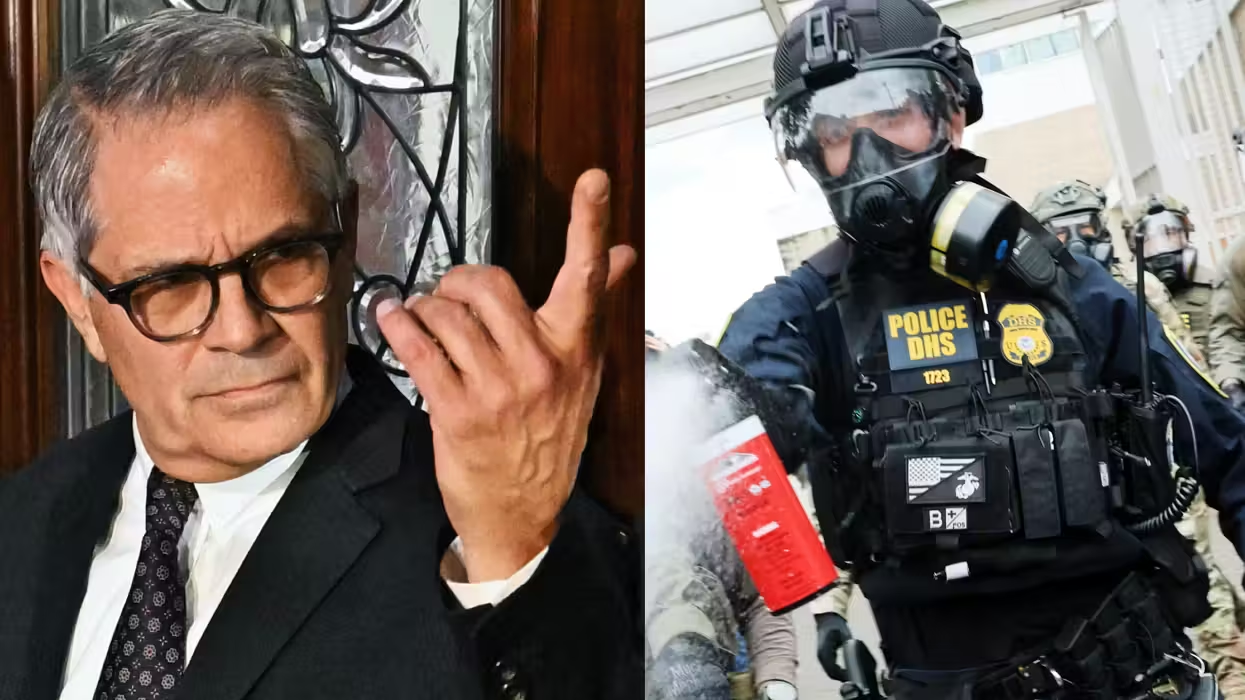© 2026 Blaze Media LLC. All rights reserved.
"He did not speak, he just began shooting." -- - Assailant identified as Wade Michael Page - Source: Tattoos suggest ties to white supremacists - Authorities have not released a motive - Officials will hold 10 a.m. press conference to share additional details --
UPDATE:
New details have just been released, including about how the shooter opened fire and hit an officer. Read them here.
--
TheBlaze's Jason Howerton contributed to this report.
- Authorities identify assailant as Wade Michael Page, 40, ex-Army serviceman
- Described by some as a "white supremacist" and "skinhead" with tattoos
- FBI investigating shooting as act of "domestic terrorism"
- Suspect may have "recently broke up with his girlfriend"
- Three victims, including police officer, in hospital with serious injuries; seven, including gunman, dead

The details are still emerging from Sunday's horrific shooting at a Sikh temple near Milwaukee, Wisconsin. After much speculation about the assailant, who killed six people before perishing in an exchange of gunfire with police, authorities claim that the man responsible is Wade Michael Page. The 40-year-old was an ex-Army serviceman out of Ft. Bragg in North Carolina.
Prior to being identified, the shooter was described by police as a white man in his 40s with a shaved or bald head and a number of tattoos. This information, teamed with biographical data, led authorities to classify the attack as an act of "domestic terrorism." This essentially means that there was a probable political agenda attached to the crime. Considering these factors, the FBI is now leading the investigation.
ABC News has more about Page:
Page, 40, opened fire outside the temple before entering around 10:30 a.m. Sunday morning and killed six people. He served in the Army from April 1992 through October 1998. [...]Though police have not given any details on the motive of the shooter, but Bureau of Alcohol, Tobacco, Firearms Special Agent Thomas Ahern said Page had tattoos that suggested he had ties to white supremacists.
"It is being investigated. And what his tattoos signified is being investigated. They are all pieces of a possible puzzle to learn what was his motive in carrying out such a horrific act," Ahern said.

Business Insider lists some of the other alleged facts that have been collected about the shooter:
- Bloomberg reports that Page "discharged honorably from the Army in 1998 after six years of service" after serving from April 1992 through October 1998 as a sergeant and later a specialist, working as a Hawk missile system repairman before becoming a psychological operations specialist.
- He was was stationed at Ft. Bliss in Texas and at Ft. Bragg in North Carolina while originally being from Colorado. Details about his discharge are not yet known.
- The Southern Poverty Law Center, a group that has studied hate crimes for decades, reports that Page was "a frustrated neo-Nazi who had been the leader of a racist white-power band." They have a picture but we have not confirmed it. Here is End Apathy's MySpace page.
(Related: 'Hate Breeds Hate': Twitter Users Blame Michelle Bachmann for Attack on Sikh Temple)
Prior to Page's identification, ABC News was already reporting that the man behind the attack was potentially a "white supremacist" and a "skinhead." The suspect's landlord also told the Greendale Patch that she believes the man had "just broken up with his girlfriend." As of Monday morning, no details regarding a potential motive were released.
Page was a "frustrated neo-Nazi" who led a racist white supremacist band, the Southern Poverty Law Center said Monday.

Mark Potok, a senior fellow at the nonprofit civil rights organization in Montgomery, Ala., said Page had been on the white-power music scene for more than a decade, playing in bands known as Definite Hate and End Apathy.
"The name of the band seems to reflect what he went out and actually did," Potok said.
"There is a whole underworld of white supremacists music that is rarely seen or heard by the public," Potok said, describing lyrics that talk about carrying out genocide against Jews and other minorities, he said.
Potok said there's no research showing white supremacists hating Sikhs, indicating that Sunday's attack was almost certainly an example of someone mistaking Sikhs for Muslims.
In a 2010 interview, Page told a white supremacist website that he joined the white-power music scene in 2000, when he left his native Colorado and started the band End Apathy in 2005.
He told the website his "inspiration was based on frustration that we have the potential to accomplish so much more as individuals and a society in whole," according to the law center. He did not mention violence in the website interview.
End Apathy's biography on the band's MySpace page said it was based in Nashville, N.C.

Following the Sunday morning shooting, tactical units went through the Sikh Temple of Wisconsin and found four people dead inside and two outside, in addition to the shooter. As many as 30 people were also reportedly injured. The lone gunman was said to be wearing tactical equipment and was armed with one handgun. Victims are being treated at a local hospital.
Dr. Lee Biblo, the chief medical officer at Froedtert Hospital in Milwaukee, said they were able to treat three seriously wounded men in their level one trauma center. He said one of the victims had been shot multiple times in the face and extremities. Another had been shot in the abdomen and a third man suffered a gunshot wound in his neck.
Personal accounts from the horrific tragedy continued to pour in throughout Sunday night.

"He did not speak, he just began shooting," said Harpreet Singh, relaying a description of the attack from the wife of his uncle, temple president Satwant Singh Kaleka who died in the attack.
Singh said Satpal Kaleka told him she was in the front room when the shooter walked in. She said the 6-foot-tall bald white man -- who worshippers said they had never before seen at the temple -- seemed like he had a purpose and knew where he was going.
Gurpreet Kaur, 24, of Oak Creek, said her mother and a group of about 14 other women were preparing a meal in the temple kitchen when the gunman entered and started firing. Kaur said her mother felt two bullets fly by her as the group fled to the pantry. Her mother suffered what Kaur thought was shrapnel wound in her foot.
"These are people I've grown up with," she said. "They're like aunts and uncles to me. To see our community to go through something like this is numbing."

Kaur said she spent the afternoon serving as a translator between law enforcement and survivors at a nearby bowling alley. Police investigators kept witnesses inside the bowling alley's basement into the evening.
"We don't even know who's downstairs," Ravi P. Singh, 25, of Greenfield, said after going to the bowling alley to see if he could get more information about what had happened.
One of the first officers to respond to frantic 911 calls seeking help was shot several times as he tended to a wounded victim, and was in critical condition along with two other victims Sunday night, authorities said. Police said the officer was expected to survive.
Late Sunday evening, the investigation appeared to move beyond the temple as police, federal agents and the county sheriff's bomb squad swarmed a neighborhood in nearby Cudahy, evacuated several homes and searched a duplex. Bureau of Alcohol, Tobacco, Firearms and Explosives agent Tom Ahern said warrants were being served at the home of the gunman.

In the wake of the tragedy, fears over anti-Sikh sentiment are rising. Police in New York and Chicago issued statements saying they were giving Sikh temples in those cities additional attention as a precaution after the shooting, which also came two weeks after a gunman killed 12 people at movie theater in Colorado.
Valarie Kaur, who chronicled violence against Sikh Americans in the 2006 documentary "Divided We Fall," was returning to her home in New Haven, Conn., after speaking at a White House conference Friday when she heard about the shootings.
Even though the gunman's motives were a mystery Sunday, Kaur said the shootings reopened wounds in a community whose members have found themselves frequent targets of hate-based attacks since Sept. 11.
"We are experiencing it as a hate crime," she said. "Every Sikh American today is hurting, grieving and afraid."
The Sikh Coalition, the largest Sikh American civil rights organization in the U.S., recommended caution in speculating in the case, saying it "remains clear that the story remains and evolving and fluid situation."
"The Sikh Coalition’s thoughts and prayers are with the victims of the shooting, the Sikh community of Milwaukee, and the larger community of Wisconsin, which we know will stand with their Sikh neighbors with their support and prayers during this very trying time," said Executive Director Sapreet Kaur in a statement.
The Council on American-Islamic Relations (CAIR) also released a statement explaining that American Muslims "stand with their Sikh brothers and sisters."
More from ABC News:
![]() video platformvideo managementvideo solutionsvideo player
video platformvideo managementvideo solutionsvideo player
The tragedy comes less than a month after James Holmes, 23, opened fire at a movie theater in Aurora, Colo. during a midnight screening of "The Dark Knight Rises," killing 12 and injuring dozens more. However, the term "domestic terrorism" was not applied in that shooting.
RELATED STORIES:
- SEVEN PEOPLE DEAD IN SHOOTING AT SIKH TEMPLE IN WISCONSIN
- ‘GOD SENT ANOTHER SHOOTER’: WESTBORO MEMBERS SEND ‘HORRIFIC’ TWEETS IN WAKE OF DEADLY SIKH TEMPLE ATTACK
- POLICE: SIKH TEMPLE SHOOTING BEING HANDLED AS ‘DOMESTIC TERRORISM,’ FBI TAKING OVER INVESTIGATION
- ‘HATE BREEDS HATE’: TWITTER USERS BLAME MICHELE BACHMANN FOR ATTACK ON SIKH TEMPLE
- OBAMA, ROMNEY RELEASE STATEMENTS FOLLOWING SIKH TEMPLE SHOOTING
This is a breaking news story. Stay tuned for updates.
The Associated Press contributed to this report.
Want to leave a tip?
We answer to you. Help keep our content free of advertisers and big tech censorship by leaving a tip today.
Want to join the conversation?
Already a subscriber?
Billy Hallowell is a digital TV host and interviewer for Faithwire and CBN News and the co-host of CBN’s "Quick Start Podcast."
Billy Hallowell
Billy Hallowell is a digital TV host and interviewer for Faithwire and CBN News and the co-host of CBN’s "Quick Start Podcast."
more stories
Sign up for the Blaze newsletter
By signing up, you agree to our Privacy Policy and Terms of Use, and agree to receive content that may sometimes include advertisements. You may opt out at any time.
Related Content
© 2026 Blaze Media LLC. All rights reserved.
Get the stories that matter most delivered directly to your inbox.
By signing up, you agree to our Privacy Policy and Terms of Use, and agree to receive content that may sometimes include advertisements. You may opt out at any time.






